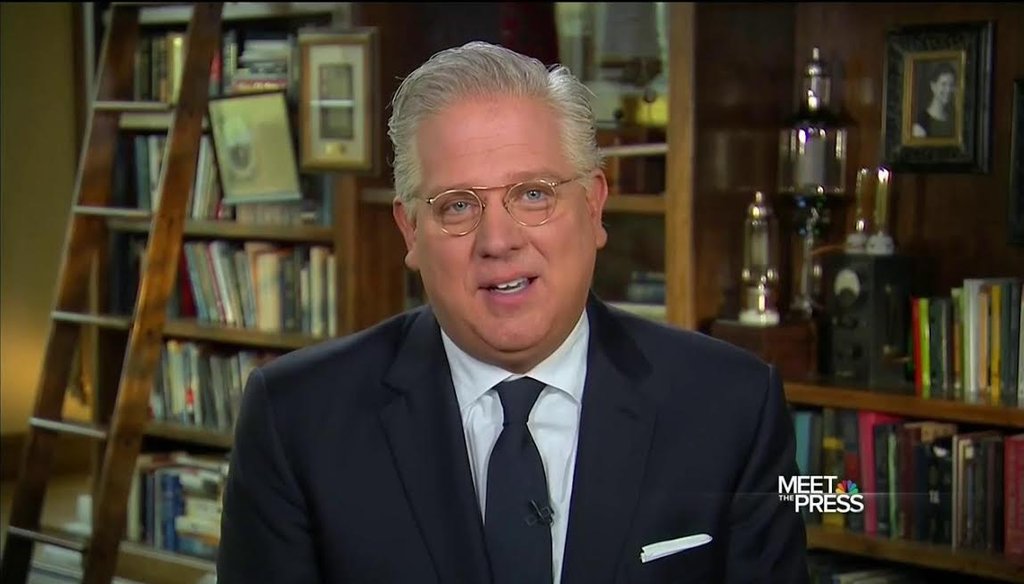Stand up for the facts!
Our only agenda is to publish the truth so you can be an informed participant in democracy.
We need your help.
I would like to contribute

Conservative commentator and Ted Cruz supporter Glenn Beck explains why he will never support Donald Trump as the GOP presidential nominee on the April 10, 2016, edition of "Meet the Press." (NBC photo)
U.S. Sen. Bernie Sanders said Sunday that he didn’t really mean to question Democratic rival and former Secretary of State Hillary Clinton’s qualifications for president.
Just her judgment, which Sanders said is "clearly lacking."
NBC Meet the Press moderator Chuck Todd pushed Sanders to elaborate.
"Well, when you vote for virtually every trade agreement that has cost the workers of this country millions of jobs," Sanders said, "when you support and continue to support fracking, despite the crisis that we have in terms of clean water, and essentially, when you have a super PAC that is raising tens of millions of dollars from every special interest out there, including $15 million from Wall Street, the American people do not believe that that is the kind of president that we need to make the changes in America to protect the working families of this country."
We wondered about Sanders’ first point on Clinton’s support for trade agreements. Is the line in the sand between them on trade so distinct?
Sign up for PolitiFact texts
His claim rates Half True.
Unlike Sanders’ two decades of consistent opposition to free trade agreement, Clinton has zigzagged through the years.
"Some people are generally pro-trade or anti-trade. She’s case-by-case on trade," Gene Sperling, director of the National Economic Council in both the Clinton and Obama administrations, told the Washington Post last year.
Clinton spoke favorably of the North American Free Trade Agreement, signed by President Bill Clinton, even though she did not have a vote on it as first lady. She changed her position during her 2008 presidential campaign, calling it a "mistake."
As a senator from New York, Clinton had the opportunity to vote on 10 trade deals. She said yes to six and no to the Dominican Republic-Central America Free Trade Agreement (DR-CAFTA) and a deal with Andean countries. She skipped votes on agreements with Jordan and Peru, which came up when she was running for president the first time, but she supported both deals.
Clinton explained her seemingly inconsistent positions in a 2005 speech to Congress: "The U.S.-Jordan Free Trade Agreement included internationally recognized enforceable labor standards in the text of the agreement. Sadly, DR-CAFTA is a step backward."
As secretary of state, Clinton walked back her opposition to deals with South Korea, Colombia and Panama, and helped negotiate them as well as the Trans-Pacific Partnership. As a presidential candidate in 2016, Clinton has reiterated her opposition to CAFTA and flip-flopped on her support for the Trans-Pacific Partnership.
Unions and liberal think tanks have projected alarming estimates of job losses from various trade deals, but nonpartisan experts and groups typically say trade deals cannot single-handedly lead to significant job losses or gains. In previous fact-checks, we’ve reported that it’s difficult to tease out the effects of a single trade deal from everything else that happens in a global economy, including shifts in technology.
Clinton vs. Trump
On the Republican side, conservative commentator and Ted Cruz supporter Glenn Beck told Todd that he would not vote for Trump under circumstances, although he said the GOP should not try to thwart Trump's nomination if he wins fair and square.
If Trump were to be the nominee, Beck said he would focus his efforts on House and Senate candidates who "would keep Hillary Clinton at bay because Trump is not going to win the general. If you look at the polls — Todd, and you know this no matter what they say — you look at the polls, Hillary Clinton wins every time with Donald Trump."
Beck accurately characterized poll results, so his statement rates True.
The compilation of national surveys by RealClearPolitics.com shows that to find a poll where Trump leads Clinton, you have to go back to a USA Today/Suffolk survey taken Feb. 11-15. It has Trump ahead by two percentage points. But the margin of error in that poll is +/- three points. That poll has not been repeated.
Since then, Clinton has won every hypothetical head-to-head matchup against Trump, and done it by a margin larger than the poll's margin of error.
In fact, since May 2015 (before Trump was officially a candidate), Clinton has scored higher than Trump in 51 of 58 surveys. In 43 of the 51 she's done it by more than the margin of error.
Trump hasn't scored higher than the margin of error since a November survey by Fox News. Fox's two most recent polls both show Clinton winning by as much as 11 percentage points.
Trump tied with Clinton in October in a survey done by Public Policy Polling, but the four PPP polls done since then show Clinton winning; the two most recent surveys put her ahead by seven percentage points.
Our Sources
See fact-checks.


































